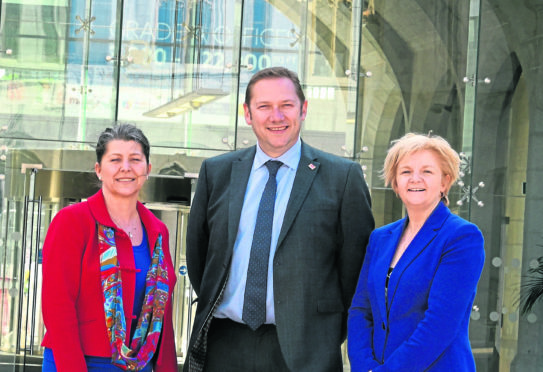A new report has painted an improving picture of Aberdeen’s economy- but has called for “flexibility” over new powers to be devolved to the council.
Last year, city council chiefs hired an expert panel made up of economists former RBS economist Stephen Boyle, Dr Hannah Morsy and Douglas Peedle to examine the future prospects for the city.
Yesterday the group launched their report at the inaugural State of the Cities Conference at the AECC in Bridge of Don, with the picture broadly optimistic.
In a wide-ranging report topping 100 pages, some key findings were:
There is a “potential” for the city’s economy to return to “moderate” growth in coming years.
Unemployment in the city fell from 3.8% to 2.9% between 2016 and 2018.
The commercial office space vacancy rate in Aberdeen reached a historic high with 14.6% of available office space unoccupied in 2017, but has since fallen to 12% 2018.
About 21% of the value of Scottish exports come from the north- east.
However, the report warns of “fundamental challenges” in the likes of uncertainty over Brexit, an ageing population and the need to diversify the economy away from the dominant oil and gas industry.
Among the recommendations made is the need to monitor progress, support new businesses and call for more devolution of powers to allow “flexibility”.
Last June, the Press and Journal revealed that the three-strong panel would be given allowances – along with travel, recruitment and administration costs – expected to total between £60,000 and £80,000 a year.
City council co-leader Jenny Laing said Aberdeen was already uniquely dependent on funding sources other than government grants – stating around half of the council’s funding came from business rates last year and pointed to the bond issue on the stock exchange.
She told the conference the council would like to have full control over rates and the ability to set a “tourist tax”.
She said: “We will continue to push for greater devolution of powers that in turn could allow local government to make decisions on the levers it needs to drive economic growth in their communities.”
Senator Lyndon Farnham, a minister for economic development, tourism, sport and culture for the Government of Jersey, also spoke at the event and said he saw similarities between the economies of the channel island and the Granite City.
He said: “Economically speaking we are both fairly reliant on single industries- in Jersey it is financial services and in Aberdeen it is oil and gas… our economic graphs are following a startlingly similar trend.”
But the report wasn’t universally welcomed.
Opposition SNP group leader Stephen Flynn said: “I can’t hide the fact that I am somewhat underwhelmed by the report given the financial outlay – much of what is detailed is already well known by those who live and work in the city.
“It’s clear that the greatest issue facing our city at present remains Brexit and the report does little to soften any worries on that front – citing real concerns in relation to our access to key skills. The people of Aberdeen were wise to
these risks and voted overwhelmingly to remain in the EU and I hope that the Tory Brexiteers running our council will reflect heavily on this.
“In terms of additional powers for councils the Scottish Government is consulting on a tourism levy – although, at present, I don’t think one should be implemented in Aberdeen. The council, of course, already has powers in relation to business rates and council tax whilst any suggestion of devolution of APD is simply nonsensical.”
Guy Ingerson, co-convener of the Aberdeen and Aberdeenshire Green party, said: “The report seems to acknowledge the need for diversification away from the boom and bust prone fossil fuel industry, but fails to provide an answer to how this should be done.”
